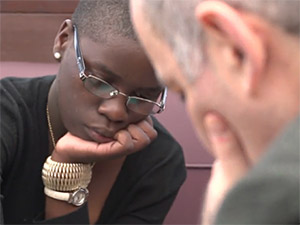


Winning starts with what you know
The new version 18 offers completely new possibilities for chess training and analysis: playing style analysis, search for strategic themes, access to 6 billion Lichess games, player preparation by matching Lichess games, download Chess.com games with built-in API, built-in cloud engine and much more.
![]()
The Daily Beast/Newsweek Women in the World Summit in New York City was a star-studded affair with a serious purpose. Celebrities and politicians mingled with activists, educators, and entrepreneurs from all over the world at world-famous Lincoln Center in Manhattan. Big names like Hillary Clinton and Angelina Jolie were flanked by women and girls with amazing stories that included human rights leaders, teengage tech start-up founders, and even an all-girl pop band from Burma!

Hundreds of speakers, journalists, and thousands of attendees came to Lincoln Center.

Next door, a more traditional production that caught our interest...
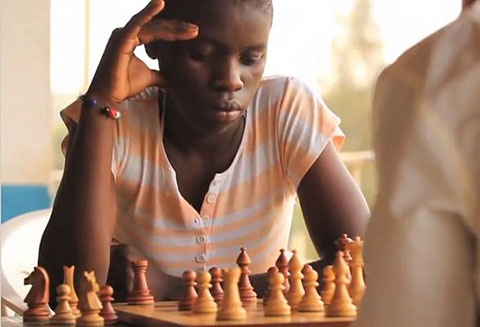
Our focus is on teen chess champ Phiona Mutesi of Uganda (photo above from 24tanzania.com) and one of the few male panelists, although you can understand why an exception was made in his case. When asked who her personal hero was, Mutesi said, "Garry Kasparov," and Daily Beast/Newsweek chief Tina Brown did not hesitate to bring the two together. Not only did they participate in a panel together, along with Phiona's coach Robert Katende and South Africa's Marisa van der Merwe of the acclaimed "Moves for Life" program, but a day earlier Phiona got to realize a dream with an over-the-board encounter with Kasparov. Phiona was nervous, and it was a casual game with no clock, but she was confident enough to give Kasparov the white pieces!
Below is a video of their encounter, and here is the story by a Daily Beast reporter in attendance.
Kasparov later recited the gamescore to us, and while it looks as one-sided as you might expect with a former world champion champ playing white, Phiona didn't make any blunders despite the circumstances. "She clearly has natural talent," Kasparov said. "It's just a shame that she couldn't receive proper coaching at a young age."
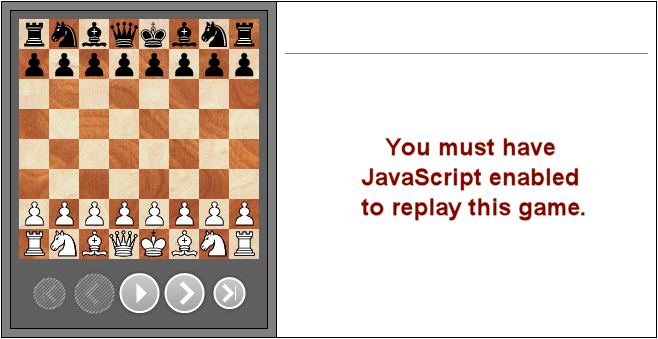
[Event "Women in the World Friendly"] [Site "New York"] [Date "2013.04.04"] [Round "?"] [White "Kasparov, Garry"] [Black "Mutesi, Phiona"] [Result "1-0"] [ECO "C53"] [PlyCount "75"] [EventDate "2013.04.04"] [EventCountry "USA"] 1. e4 e5 2. Nf3 Nc6 3. Bc4 Bc5 4. c3 d6 5. d4 exd4 6. cxd4 Bb6 7. Nc3 Nf6 8. d5 Ne7 9. h3 Ng6 10. O-O O-O 11. Re1 a6 12. Be3 Bxe3 13. Rxe3 Re8 14. Qd2 Qe7 15. Rae1 Ne5 16. Bf1 Nxf3+ 17. Rxf3 Qe5 18. Rd3 Qh5 19. f4 Qh4 20. Qf2 Qxf2+ 21. Kxf2 h6 22. e5 Nh7 (22... dxe5 23. fxe5 Nd7 24. Rde3 f6 25. e6 Ne5) 23. Rde3 Bd7 24. e6 fxe6 25. dxe6 Bc6 26. g4 Re7 27. Kg3 Rae8 28. Bd3 Nf8 29. f5 Nh7 30. h4 Nf6 31. g5 hxg5 32. hxg5 Nd5 33. Nxd5 Bxd5 34. Be4 Bxa2 35. b3 c6 36. Bc2 d5 37. f6 gxf6 38. gxf6 1-0
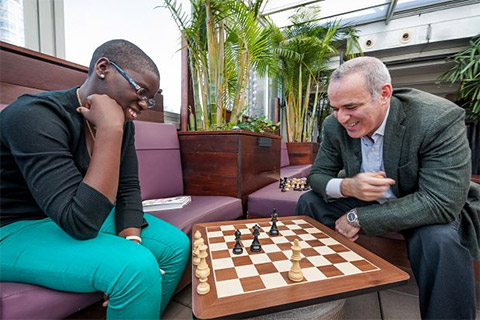
Mutesi and Kasparov set up a humorous stalemate for the photographers after their game.
Their panel at the Women in the World Summit ranged from Phiona's personal story to the big picture theme of the importance of education in the developing world. Phiona was born in the slums of Katwe in the Ugandan capital of Kampala. Her father died of AIDS when she was three and she had to sell corn in the street instead of going to school. Her first appearances at the local chess gathering started by Robert Katende were inspired not by an interest in the game but by the fact there was free food available to the players. And yet last year, at 16, Mutesi won the Ugandan national junion championship – open, not girls – and also represented Uganda in the Women's Olympiad in Istanbul.
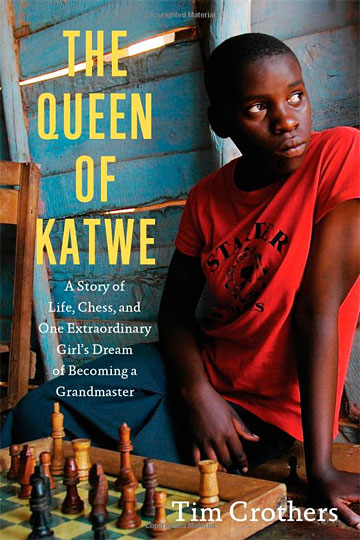
An amazing journey. So amazing, in fact, that there is already
an award-winning book about Phiona to which Disney has purchased the movie rights!

Robert Katende, Phiona Mutesi, Garry Kasparov, Marisa van der Merwe
backstage at the Women in the World Summit.

Mutesi, Kasparov, and Summit organizer and Daily Beast editor Tina Brown
Marisa van der Merwe is already known to ChessBase readers as one of the founders and leaders of the Moves for Life program in South Africa. In 2012, as we reported here, she won the prestigious Woman of the Year award in the field of education. Visiting some of these programs in South Africa, from wealthy private academies to poor schoolhouses in the townships, inspired Kasparov to accelerate cooperation with his Kasparov Chess Foundation Africa in bringing chess into the education system across the continent, and the world. KCF was launched in the US in 2002 and opened KCF Europe in 2011.
"Unlike other sports and most other school activities, chess provides kids with the knowledge and confidence they can achieve intellectually," said Kasparov. "This self-confidence is more important than the proven academic benefits that come with chess. Not only is chess inexpensive – no stadium or pool needed – but you are teaching kids they can do things with their minds, and that transfers to everything they do with their lives. This is an assumption for well-off kids, but in the developing world and in poor areas, it can be an important discovery. This is why it's such an important issue. It's not just about promoting chess, it's the possibility of a better life. You don't have to become a star like Phiona to have your life changed by chess!"

Kasparov also spoke beyond chess about how critical early education is for the region in combating the plagues of violence and poverty. "It is wonderful that the developed world contributes medicine and food aid, of course," said Kasparov, "but you cannot be a magician only the morning! You must continue or else you are throwing good seeds on hard ground. Education is the key to building a modern economy. Education is the key to beating the extremists and warlords. This is why these thugs burn schools and attack students. And in the long run it is also cheaper for the West to help create safe universal education than to require costly military intervention after these areas become violent and radicalized." You can read more on these themes from Kasparov in his Daily Beast follow-up op-ed, "How Chess Saves Lives."
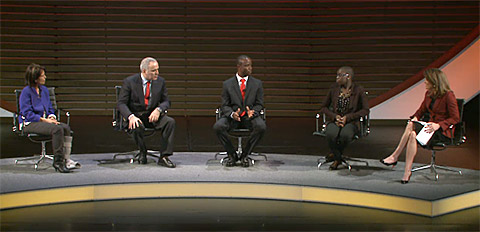
On stage at Lincoln Center with CBS news anchor Norah O'Donnell.
You can watch the full panel discussion below, and hear for yourself how enthusiastically the audience responded to all of the participants.
Links